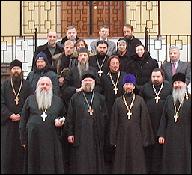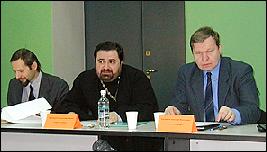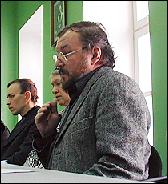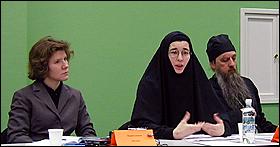Moscow November 13-16 2002
The Second Ecclesio-Historical Conference "The History of the Russian Orthodox Church of the 20th c. (1930-1948)"

On Saturday, 16 November, the Second ecclesio-historical conference "The History of the Russian Orthodox Church of the 20th c. (1930-1948)" came to a conclusion. Below is a list of speakers and lectures, along with a summation of the Conference.
Protopriest George Mitrofanov (St. Petersburg) (see photo): "The Russian Orthodox Church in the Initial Stages of the Anti-Bolshevik Movement (1917-1945)."

Mikhail Nazarov (Moscow) (see photo): "The Council in Karlovtsy in 1921 and the All-Diaspora Council of 1938."

Protopriest Alexander Lebedev (Los Angeles, CA) : "The Paths of the Russian Orthodox Church Outside of Russia in America (1921-1948)."
Viktor Kosik (Moscow): "The Russian Orthodox Church in Yugoslavia (1920-1950)."
Protopriest Victor Potapov (Washington, DC): "The Russian Orthodox Church in the Holy Land (1921-1948)."
Priest Dionisii Pozdnyaev (Moscow): "The Russian Orthodox Church in the Far East in the 1930's."
Protopriest Boris Danilenko (Moscow): "Various Positions of Russian Clergymen in Bulgaria in Regard to the Jurisdictional Question (1930-40)."
Alexander Gavrilin (Riga): "The Latvian Orthodox Church in the 1930s."
Nun Vassa (Munich) (see photo): "The Ecclesiastical Principle of Ekonomia and Positions of the Russian Orthodox Church Outside of Russia under Metropolitan Anastassy."

Hieromonk Evfimii (Moscow0: "On the Pochaev Succession in the Russian Diaspora."
Sergei Firsov (St. Petersburg): "The Atheist Press at the End of the 1930's. "
Anatolii Kashevarov (St. Petersburg): "The Press and Publications of the Moscow Patriarchate of the 1930-40's."
Lydia Golovkova (Moscow): "Moscow Executions of the1930's (the Butov Firing Range and Kommunarka.)"
Alexander Kornilov (Nizhny-Novgorod): "Podvizhniki of the Persecuted Church: Kievan Protopriest Adrian Rimarenko."
Alexander Zhuravsky (Moscow-Kazan): "The Relationship of the Moscow Patriarchate to the Heterodox and the Ecumenical Movement (1930-1948)."
Reader Andrei Psarev (Jordanville, NY): "The Attitude of the Russian Orthodox Church Outside of Russia towards Heterodox and the Ecumenical Movement (1920-1948)."
Olga Vasilieva (Moscow): "The USSR: a New State Policy Towards the Russian Orthodox Church (1941-1948)."
Mikhail Shkarovsky (St. Petersburg): "German Policy Towards the Russian Orthodox Church (1941-1945)."
Protopriest Nikolai Artemoff (Munich): "Several Facts on the Belarussian and Ukrainian Autonomous Churches (1941-1946)."
Protopriest Valentin Asmus (Moscow): "Archbishops Anthony (Khrapovitsky) and Sergius (Stragorodsky) in the Diary of Archbishop Arsenii (Stadnitsky)."
Maria Sotskova (Moscow): "The Russian Church and Patriotism During World War II."
Olga Kosik (Moscow): "The 'Anti-Soviet Church Underground' Investigation (1943-1946)."
Stanislav Petrov (Novosibirsk): "Communities of True Orthodox in the Legal Prosecutions of the Impostors (1930-1950)."
Priest George Orekhanov (Moscow): "The Viewpoint of Several Hierarchs Abroad on the Church Situation in Russia 1920-1940."
Protopriest Peter Perekrestov (San Francisco, CA): "The Attitude Towards the Russian Church in the 20th century of St. John of Shanghai and San Francisco the Miracle-worker."
Conclusion
A conference was held on 13-16 November 2002, in the Synodal Library of the Moscow Patriarchate (Andreev Monastery, Moscow), devoted to questions of the history of the Russian Orthodox Church in the 20th century. One year ago, a similar conference was held in Sentendra (Hungary). With the blessing of their hierarchs, clergymen of the Russian Orthodox Church (Moscow Patriarchate) and the Russian Orthodox Church Outside of Russia participated, as well as representatives of the historical academia. The Conference heard 25 lectures and reports from scholars from Russian (Moscow, St. Petersburg, Kazan, Nizhny-Novgorod, Novosibirsk), Latvia, Germany, the USA (Washington, DC, San Francisco and Los Angeles, CA, and Jordanville, NY).
The Conference concentrated on the following topics:
- The history of the Russian Orthodox diaspora, especially in the Far East, the Holy Land, the Baltics, North America and the Balkans.
- Problems of jurisdictional divisions of the Russian Orthodox Church in the Homeland and abroad.
- Problems of the survival of the Orthodox Church in totalitarian states.
- The Orthodox Church during World War II.
- The attitude of the Russian Orthodox Church towards the ecumenical movement.
- The repressions of the atheist state and the struggles [podvigi] of the New Martyrs and Witnesses of Russia.
Upon studying these topics, the participants noted that a number of persistent prejudices hinder the discover of ecclesio-historical truths. Contradictions were exposed, caused by differing perceptions of church-historical terminology.
The lecturers drew from historical resources previously unused in historical research.
In an atmosphere of relative freedom of expressing its position, the Russian Orthodox Church Outside of Russia, in the examined period, formulated a theological evaluation of the anti-Christian essence of communist ideology.
The discussion of political policies of the leaders of the Moscow Patriarchate and the Russian Orthodox Church Outside of Russia during World War II revealed several divergences in the opinions of the conferees. At the same time, agreement was expressed that the representatives of the Russian Orthodox Church, in their activities under the yoke of godless totalitarian states was forced to compromise with the state. Still, under these trying conditions, the Church was able to preserve the purity of its teaching of the faith and canonical structure.
An important aspect of the research was recognized as being the study of the biographies and struggles of the hierarchs of the Russian Church, their important, though differently evaluated, experience in preserving Church life under godless authorities.
It was noted that the attempt of the Nazi leadership to divide the Church into separate and even inimical church formations was met with internal church opposition.
The children of the Russian Church in the Homeland and in the Diaspora understood their service to Russia differently at various times. Still, it is clear that first of all they relied on Divine Providence and believed in the inner strength of the Russian people.
The Conference reviewed examples of the exploitation of the Church by the state in its propogandistic goals under conditions of acute opposition of political systems.
The importance of the comprehensive study of the witness of the Church under godless conditions was noted, especially of the struggle of the New Martyrs and Witnesses. This goal becomes more attainable in accordance with the growing accessibility of research material and other archival documents.
The achievements of the Russian Orthodox Church Outside of Russia were emphasized in its preservation of the traditions of Russian ecclesiastical piety and of Orthodox holy items and sites.
The continuation of these conferences was seen as desirable in the aim of better understanding between the two parts of the Russian Orthodox Church.
3/16 November 2002
Moscow